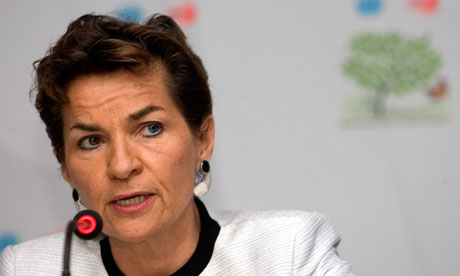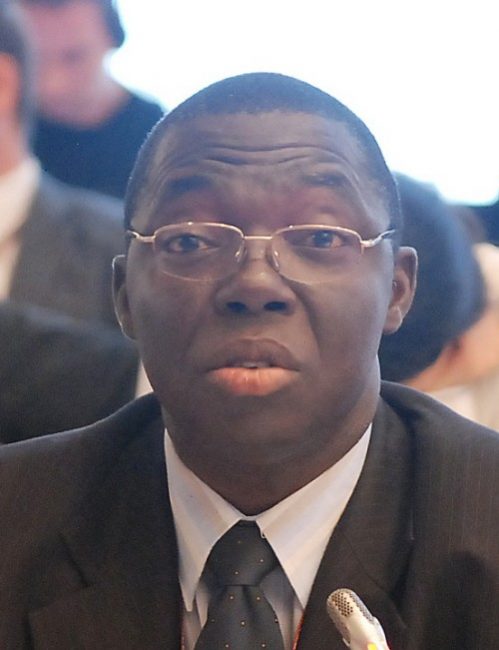In demonstration of its commitment to the global efforts to curb global warming by reducing greenhouse gas emissions, Nigeria has formally kick-started the process of preparation of the Intended Nationally Determined Contributions (INDCs), writes Olufemi Adeosun

The need for all parties to the UN Framework Convention on Climate Change (UNFCCC) to be committed to setting realistic target towards reducing the greenhouse gas emissions formed the fulcrum of discussion during the 19th session of the multilateral climate forum which took place in Warsaw, Poland in 2013.
One of the resolutions arrived at the meeting was the need for all parties to the convention to submit their Intended Nationally Determined Contributions (INDCs). The document is expected to contain policies and programmes that align with the global attempt to reduce the level of global warming by reducing greenhouse gas emissions.
According to environment experts, the borderless nature of the negative effects of climate change has compelled nations of the world to come together to explore ways of addressing the drift. They noted that although the level of technological advancement in the developed economies has made them major emitters, the negative effects of it is more biting on the developing nations because of their low resilience status.

For instance, in Nigeria, the extreme desert encroachment in the northern parts of the country, erosion problem in the East, menace of ocean surge and flooding in the South-West have been regarded as manifestations of the negative effects of climate change.
These environmental challenges, they added, are not only constituting a blight on the poverty alleviation programmes of successive governments in Nigeria, they are aiding the worsening security situation confronting the country.
It is against this background that environment experts during a recent stakeholders’ forum in Abuja urged the new administration to utilise the opportunity availed through the development of the INDCs document to embark on policies and progrmmes that would not only help to address, in a sustainable manner some of these climate change induced challenges, but also help to steer the country on the path of low carbon economy and high growth without jeopardising its development priorities.
As part of the processes for the successful submission of the document in September, Nigeria had two months ago hosted a Project Initiation Workshop in April 2015, in Abuja. It also recently commissioned a British environmental consulting firm of Ricardo-AEA to execute the project. The consortium, which is being led by a climate change policy expert, Hans Verolme, will be supported by local experts such as Prof. Olukayode Oladipo who is also a leading climate change expert and James Okeuhie.
Speaking at the sidelines of the consultants/stakeholders’ meeting in Abuja, the Director, Climate Change Department, Ministry of Environment, Dr Samuel Adejuwon, underscored the significance of the INDCs to the country. According to him, apart from helping the country to develop its developmental programmes across the various sectors of the nation’s national life in a greener manner, it would also help to address some of its environmental challenges in a sustainable manner.
On the modalities for the production of the document, he said: “The whole exercise (INDCs) will consider some priority sectors, look at the baseline and look at our needs too for development and see what we can put on the table that we are going to strive to mitigate in terms of greenhouse gases (GHGs). And it is not something you just rush into without understanding because you are never too sure whether the potential agreement in Paris will be legally binding.”
According to him, the requirement for countries to submit their commitments ahead of the conference is to see if they will be able to address the impact of climate change. He, however, maintained that the ministry had held series of workshops to fulfil its commitment to climate change conventions and protocols as well as exploit opportunities as a party to the protocols.
Prof. Oladipo stated that the development of the document would enable the country diversify its energy base, particularly the need to do away with fossil fuel.
He said, “Maybe many who do not understand it means may be underestimating it. But, as an expert, it points to the fact that whether Nigeria likes it or not, the era of fossil fuel is over. Every country is now exploring how to use lesser energy for more things in an efficient manner, how to rely on renewable energy sources than what we are doing and how to be able to drive our economy through reduced energy consumption without actually reducing the rate at which our economy is growing.”
When reminded that implementation of policies has always been a problem in Nigeria, he maintained that the present administration had demonstrated sufficient commitment to the issue of climate change and such the issue of whether it would be able to muster the needed political will to push it through should not arise.
“I have to be honest with you and I have been saying it since President Buhari assumed the leadership of the country that, for the first time, we have a Nigerian President who reflected climate change in his electoral campaigns. Not only that. During his inauguration, climate change was recognised as one of the challenges that government will face. That gives me the confidence and the joy that Nigeria is now recognising the importance of carrying climate change along the developmental path. I am confident this government will accord it a pride of place. Moreover, the document must be approved by the Federal Executive Council (FEC).”
Also, a Deputy Vice Chancellor, University of Lagos and member, National Committee on COP21, Prof Babajide Alo, noted that beyond Paris, INDCs would be an action plan that would be of immense benefit to the nation as it would help it develop policies that promotes green living.
In particular, he said, the document would help the country reduce the effect of climate change, reduce flooding.
United Nations Development Programme (UNDP) Country Director, Dr Pa Lamin Beyai, noted that the process was extremely important for Nigeria in view of its leadership role within the African continent.
He said: “The process is extremely important for Nigeria because of the leadership role Nigeria stands to play in the area of climate change negotiation in Africa. If Nigeria is serious about pushing forward the climate change agenda, it is important that the INDCs be developed in a very robust manner. That is why the UNDP supported the preliminary discussion on the INDCs. We will continue to support Nigeria in its climate change efforts.”
